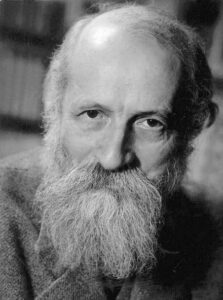
Martin Buber (Feb. 8. 1878 – June 13, 1965) was born in Vienna and after his parents divorced he was raised by his grandfather, Solomon Buber, a scholar of rabbinic literature. He was a direct descendant of the 16th century rabbi known as the Maharam, Meir Katzenellenbogen. Another relative was Karl Marx. Buber studied philosophy in college and also attended two early Zionist Congresses, becoming the editor of the weekly Die Welt, an organ of the Zonist movement.
He and Theodor Herzl disagreed on what Zionism should be. Herzl favored Zionism as a political, nationalistic movement; Buber thought it should be primarily an exemplary religious movement. Buber urged the creation of a binational Jewish-Arab state in which both would live and cooperate amicably. He also envisioned a federation of countries in the Middle East. In 1898, he met his future wife Paula Winkler who left the Catholic Church and converted to Judaism.
In 1923, Buber wrote his famous essay on existence, Ich und Du, which was translated into English as I and Thou. Ich-Du relationships involve the concepts of ‘encounter,” “meeting,” “dialogue,” “mutuality,” and “exchange,” where as in Ich-Es (I and It) relationships, there is no dialogue or exchange, there is only monologue. Other things or people exist only to serve the interests of the individual in question. Other well-known works of Buber’s related the morality tales of Rabbi Nachman of Breslov and of the Baal Shem Tov. He also liked to retell Chinese folk tales
Buber was a respected scholar in Germany until Hitler’s rise to power and the advent of Nazism. He moved to Jerusalem in 1938, where he taught at the Hebrew University. He and Paula had two children: a son, Rafael, and a daughter Eva Strauss-Steinitz. They helped raise their grandchildren Barbara Goldschmit and Judith Buber Agassi.
Tomorrow, February 9: Carole King
*
SDJW Condensation of a Wikipedia article